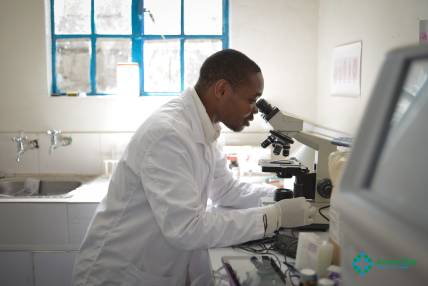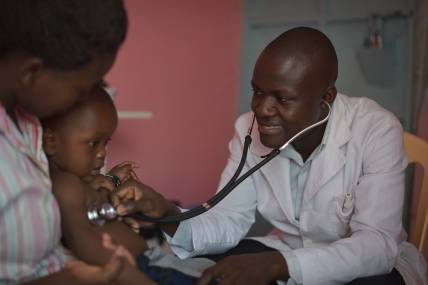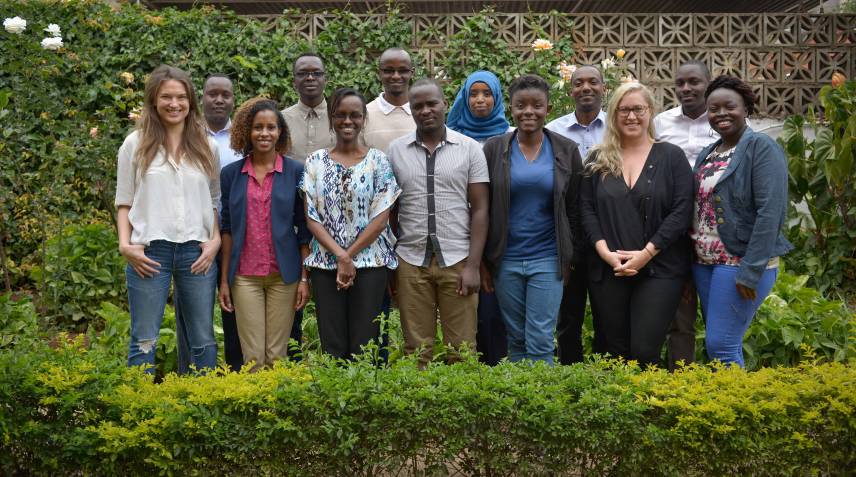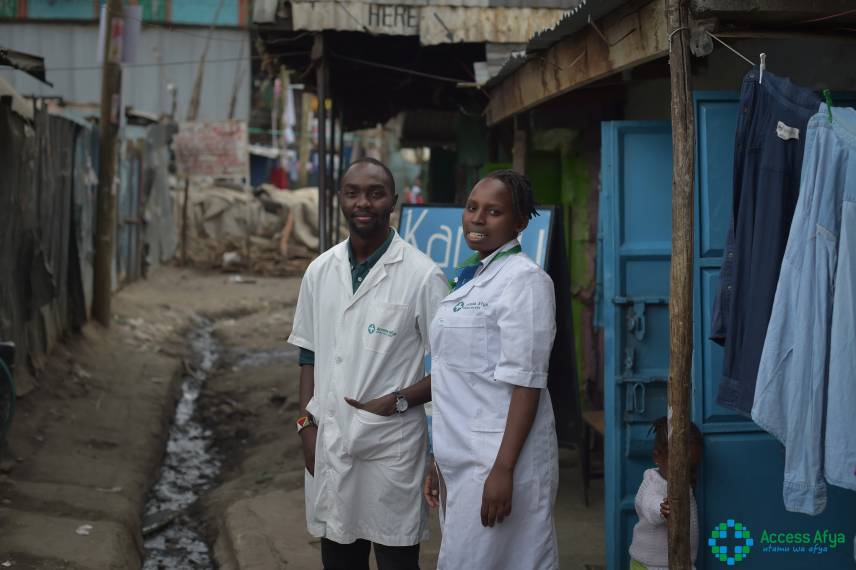A Wagner alum’s journey to redefine the healthcare system in Nairobi’s slums
In Kenya, more than two-thirds of the urban population lives in slums, and there are only 0.2 physicians and 1.3 beds per 1,000 people. The Organisation for Economic Co-operation and Development (OECD) average ratio is 3 physicians and 4.9 beds to 1,000 people. Oftentimes, this means that many families are forced to choose between quality healthcare and affordable healthcare—a choice no one should have to make. This is where Access Afya comes in. Access Afya is a low-cost, social health enterprise developed and led by NYU Wagner alumna Melissa Menke (MPA-PNP 2012).
Access Afya focuses on delivering basic, affordable, quality healthcare to Nairobi’s two million slum dwellers via a high-tech, team-based, data-driven model for less than $4 a visit. Access Afya’s first clinic opened in December 2012; and the company has grown to five, fully operational clinics and pharmacies serving more than 25,000 patients. The company provides primary healthcare through an integrated network of community retail clinics and field-based or mobile health programs.
Its primary clinics, open 12 hours a day, are located within slum communities and offer a variety of services including consultations, lab testing, diagnosis, chronic condition management, immunizations, family planning, maternal and child health, first aid, and emergency care. The clinics are modeled to fit seamlessly within communities and are designed for spatial efficiency with a 12’ x 15’ footprint.
Access Afya’s mobile health teams take clinics to the people. Past programs brought medical services to factory workers and schools, tailoring patient care to the needs of each group.
Every single patient seen receives a follow-up call from Access Afya post-visit, and a second follow-up visit is free.
“It’s important to understand that we don’t skimp on quality, and our staff is trained to get patient feedback. Consistent, personalized care that involves the patient is what is missing from the current care system in Kenya, and we are a business that puts the patient first,” says Menke.

Digital technology is also a key component of Access Afya’s model. This includes a new electronic medical system to provide the best service to patients and sending appointment reminders via text message—a popular mode of communication in Kenya.
Menke and her team have explored new technology services for patients including hearing tests via mobile apps and roving ultrasound equipment. They have also partnered with Sasa Finance to offer micro-credit loans to patients.
“Digital is the way the world is going, and healthcare is shifting towards this focus. By going digital, you can lower costs, find outliers in patient care, and standardize diagnostics and point of care measurements—all of which result in better care for our patients.”
In 2007, during her undergraduate program, Menke spent a semester in Nairobi and was shocked to hear stories of locals lacking safe access to primary care. Stories ranged from avoiding hospitals because a patient couldn’t afford a visit, to spending time and lost wages waiting in hours-long lines, to buying questionable medicine over the counter from unlicensed and unsafe pharmacists. She knew that there had to be a way to provide better and more affordable healthcare to Kenyans.
While at NYU Wagner, her idea of Access Afya fully came to fruition. In her second year of graduate school, Menke served as a Finance Teaching Assistant and president of the Microfinance Institution at NYU Wagner where she began exploring ideas in social business and enterprise.
While in school, she made connections that have proved to be invaluable. At one of the microfinance events, Menke shared her idea of bringing affordable healthcare to Nairobi’s slums with a panelist who later joined the team as an angel investor. In a social entrepreneurship class, an NYU Wagner professor introduced her to the head of health at Ashoka, one of the leading social enterprise organizations, who has included Access Afya in its Making More Health initiative, which connects health enterprises to expertise and funding.
After graduating, Menke moved to Kenya—she even lived for a while with a fellow NYU Wagner alum—to build the first clinic.
“We have benefited from the fact that Nairobi is quickly becoming a startup hub,” says Menke. “The government has been very supportive of our model, and it was important to me that it would be a primarily Kenyan company.”

For instance, each clinic care team is comprised of local Kenyan clinical officers, lab technicians, and clinical assistants hired from the neighborhood. More than 30% of the entire company comes from the slums where Access Afya works, and over 90% of the full team is Kenyan.
This past year has been the strongest year yet for Access Afya. Its third main clinic, Kiambiu, which opened last year and features more rotating specialty services, has been busier than ever.
They also recently launched two pharmacies, bridging the link between the field programs and clinics. In the first month alone, the pharmacies served 900 people and they continue to grow.
Additionally, 11,000 patients were screened for diabetes and hypertension risk through a project with Boehringer Ingelheim, Ashoka, and PharmAccess Foundation. The team found that 13% of people screened had risk factors and of those, 80% had no idea that they might have diabetes or hypertension. Access Afya is currently working on converting all patients with cardiovascular health risks into clinic patients, where they can receive information and purchase testing and medication to manage their conditions.
The company has also recently partnered with Heineken Africa Foundation to launch a mobile maternal and child health clinic in six communities, sharing essential medical services and monitoring growth and nutrition. Through this mobile clinic, over 7,000 women and children will receive care.
As her organization continues to flourish, Menke has no plans to slow down. By 2020, she aims for Access Afya to become the largest low-cost primary care provider in Kenya. Access Afya has raised $1.1 million to open 10 clinics in the next year, with the goal of serving 350,000 patients with the new sites and 700,000 by 2020.
“At NYU Wagner, I remember [our dean] telling us that the careers of our generation are going to be much more fluid, and that public service was an approach and not only confined to public sector work. This still resonates with me today—and made Wagner a great foundation for developing a social business.”
For more information on Access Afya and Melissa’s journey, visit www.accessafya.com.

